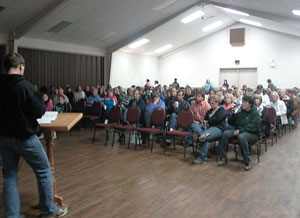
Drumheller residents are soon to be introduced to the new Solid Waste Collection system.
In the next two weeks, the town will dedicate the time of a summer student to help with the new system roll-out and people through the transition process, and the assessment of properties where residents with special needs live. Education packs will also be distributed, explaining where the carts need to be placed.
Some details are yet to be finalized, but with tenders now awarded, a new bylaw in place, the town is putting together the process for the change in the waste collection.
During their regular meeting on Monday, April 26, Council awarded the tenders for both the commercial and the residential new automated cart collection to H & H Huxted Services, in the amount of $1,339,600.44 and $657,764.64 excl. GST, respectively.
In his report to Council, Al Kendrick, director of Infrastructure Services, explained the tenders were within the town budget, with the residential one within the current 3-year budget, and the commercial one not affecting the budget as it is an exclusive franchise.
Having an exclusive franchise will also reduce the town’s administrative costs by monitoring only one provider and recycling services will carry on to be provided to most businesses as part of the exclusive franchise.
The report also highlights the commercial tender is on average 16.47 per cent lower than the current charges to commercial users.
A contract was also awarded for the supply of the 360 litre carts, equivalent to 5 garbage bags, for the new waste collection system to IPL for $203,326. As well as competitive pricing, the supplier was chosen for its presence in Calgary and being a Canadian company.
This pricing includes options such as Radio Frequency Identification (RFID) tags and reading equipment, delivery, distribution and education packages, although Kendrick told The Mail there may be savings on this pricing.
“We still have a bit of negotiations with regard to the radio frequency equipment as well as the markings, we may end up stamping the Town of Drumheller logo on them….we haven’t really totally finalized the price.”
The tags will serve a dual purpose.
They will help track carts if they go missing, or are misplaced, and collections will read the tags and be logged.
A first cart, which has a 20- year lifespan, will be given to each property free of charge and will be residents’ responsibility. Any further carts will need to be purchased by the resident from the town.
As those carts will be public property and cannot be personalized, the RFID tags will help recover them if they go missing. However, the tags are only readable at close range, so residents are advised to secure the carts after collection days as loss or theft will be their responsibility.
Residents should also familiarize themselves with Bylaw #10-10, created to take into account the manual and the automated collection, and includes a section on penalties, ranging from $50 to a minimum of $1,000 for contraventions to provisions in the bylaw.
The date of the change over has not yet been confirmed as it will depend on the time it will take for H & H Huxted to be equipped with the new waste collection vehicle.















